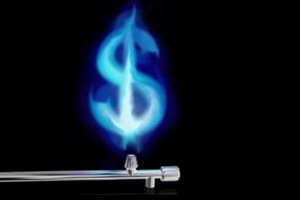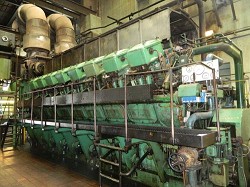For the last 60 years electricity generation in Bermuda has been dominated by a single utility, BELCO, which operates a 165 MW diesel fuel oil electricity generating plant. Almost 50% of the diesel fuel engines at BELCO must be retired in the next 5 years requiring investment by BELCO in new electricity generation (BELCO 2011). The recent boom in 'fracking' in the US has led to historically low natural gas prices and forecast high reserves – this has recently led BELCO to propose a large new natural gas facility for Bermuda.
 Bermuda should not be investing in Liquefied Natural Gas (LNG) today. We have a significant opportunity to change our energy generation paradigm: BELCO needs to replace its aging diesel fuel oil generators and is proposing to replace them with a new LNG-based plant (Mello, 2013). But we should seize this opportunity to invest in a way that will reduce our dependence on environmentally, financially and politically uncertain fossil fuel, and be of benefit to the island today and 30 years in the future.
Bermuda should not be investing in Liquefied Natural Gas (LNG) today. We have a significant opportunity to change our energy generation paradigm: BELCO needs to replace its aging diesel fuel oil generators and is proposing to replace them with a new LNG-based plant (Mello, 2013). But we should seize this opportunity to invest in a way that will reduce our dependence on environmentally, financially and politically uncertain fossil fuel, and be of benefit to the island today and 30 years in the future.
 Belco's Old Power Station. All five remaining diesel engines were due to be retired in 2014.Bermuda has a moral obligation to reduce greenhouse gas emissions but there are better ways to do this then to replace our diesel fuel oil engines with LNG fuelled engines. We may be a very small contributor to greenhouse gas emissions on a global scale but we have an obligation under the Kyoto accord to reduce our emissions (Bates, 2014). Our per capita emissions of greenhouse gases are more than twice the world average (Department of Energy, 2011) and significantly above the UK average (Bates, 2014).
Belco's Old Power Station. All five remaining diesel engines were due to be retired in 2014.Bermuda has a moral obligation to reduce greenhouse gas emissions but there are better ways to do this then to replace our diesel fuel oil engines with LNG fuelled engines. We may be a very small contributor to greenhouse gas emissions on a global scale but we have an obligation under the Kyoto accord to reduce our emissions (Bates, 2014). Our per capita emissions of greenhouse gases are more than twice the world average (Department of Energy, 2011) and significantly above the UK average (Bates, 2014).
The primary component of LNG is methane, a much more potent greenhouse gas than carbon dioxide. While LNG as a fuel for electricity production is often touted as having significantly lower impact on climate change than conventional fuels, if at any point the methane escapes it is more than 20 times more potent as a heat trapping gas in the atmosphere than carbon dioxide (EPA, 2014). Recent evidence suggests that 'fracking', the process of fracturing shale rock to release the natural gas, results in leakages in three places: from the wells, from the pipes, and at the end user, and enough methane is being emitted into the atmosphere to more than cancel out the benefits of substituting it for other fossil fuels (Brandt, 2014).
One of the attractions of LNG for BELCO is the potential for lower cost for electricity production, but this is a high risk bet. Prices have been very low in the last couple of years due to the 'fracking' boom in the US, but investment in major energy infrastructure commits Bermuda for the next 25 to 30 years, and the price of LNG is likely to rise significantly in that time. According to the US Department of Energy, 90% of new power plants in the US will be gas-fueled, which will dramatically increase demand for LNG (reported in Tomain and Cudahy, 2011). LNG availability and pricing is also susceptible to political and global instability; in fact a recent Politico article suggested that the crisis in Ukraine crisis could present the US with an opportunity to export LNG to Europe (Yergin, 2014), which would further boost demand, and with it, the price of LNG.
Another source of uncertainty is that US gas reserves appear to be over-estimated. The US Energy Information Administration (EIA) recently revised its estimate of shale gas reserves down by 42% (Hughes, 2013). 80% of US shale gas comes from only 5 locations, several of which are already in decline, and the cost of extracting gas will increase as the highest potential sites are depleted (Hughes, 2013). Domestically, political opposition to fracking by locals who fear threats to health and water supplies is leading states such as NY to turn away from fracking altogether (Walsh, 2013).
Bermuda's relative isolation makes it critically important that we place the right bets for energy. In 2011 BELCO proposed a $300M upgrade of the plant to include replacement of the diesel fuel engines and some investment in renewable energy plants. However, two years later they have changed tack and BELCO has said that instead they are investing in LNG (Mello, 2013), and are no longer planning significant investment in renewables in the near future. Bermuda has done very little to boost energy efficiency beyond consumer education. Mandating energy efficiency for buildings could reduce demand for electricity by up to 30% (Gravelly, 2013) and other investments such as smart meters could save a further 10-20%. This is where we should be investing as an island.
The fracking boom in the US has made LNG look like an attractive option today, but snatching at it like a child grasping at low-hanging Christmas tree baubles is not a long-term solution; replacing our aging fossil-fuel plant with more of the same is inertia, not an energy policy. We can and should replace the diesel fuel oil engines that will be retired with untapped options: conservation, smart meters, and energy efficiency. All of these require some investment – this is a sounder investment for the long term than LNG.
{slider=References}
- BELCO (2011). Public Forum Presentation. Retrieved from www.belco.bm.
- Department of Energy (2011). 2011 Bermuda Energy White Paper: A National Energy Transition . Retrieved from www.energy.gov.bm/portal/server.pt.
- Bates, L, 2014. 2012 UK Greenhouse Gas Emission, Final Figures. Department of Energy and Climate Change, 2014. Retrieved from https://www.gov.uk/government/uploads/system/uploads/attachment_data/file/277021/20140204_2012_UK_Greenhouse_Gas_Emissions_Final_Figures.pdf
- Brandt, 2014. Methane Leaks from North American natural Gas Systems. Science vol 343, pp 733-735.
- EPA, 2014. Overview of Greenhouse Gases. Retrieved from http://epa.gov/climatechange/ghgemissions/gases/ch4.html
- EPA 2012. US Greenhouse Gas Emissions. Retrieved from http://www.epa.gov/climatechange/science/indicators/ghg/us-ghg-emissions.html
- Gravelly, P, 2013. "The District of Columbia: A Case Study for Implementing a Data-Driven Approach for Sustaining Energy Consumption Reductions in Municipal-Owned Buildings". (Unpublished Masters thesis), Duke, Nicholas School of the Environment. Raleigh, NC.
- Hughes, J.D., 2013. "Drill, Baby, Drill: Can unconventional fuels usher in a new era of energy abundance?". Post Carbon Institute. Accessed at www.postcarbon.org/reports/DBD-report-FINAL.pdf March 4, 2013
- Mello, M, 2013. "Ascendant chief pushes LNG option". The Royal Gazette, May 16, 2013.
- Tomain, J.P. and Cudahy, R.D., 2011. Energy Law in a Nutshell. St Paul, MN, West Publishing.
- Walsh, G.M., 2013. "NY Local Fracking Bans Upheld by Appeals Court". Huffington Post. Retrieved from http://www.huffingtonpost.com/2013/05/02/ny-local-fracking-ban-appeals-court_n_3203120.html
- Yergin, D, 2014. "Vladimir Putin won't threaten Europe's gas, for now". Politico, March 3, 2014. Retrieved from http://www.politico.com/story/2014/03/daniel-yergin-russian-president-vladimir-putin-ukraine-crimea-104215_Page2.html
{/slider}




